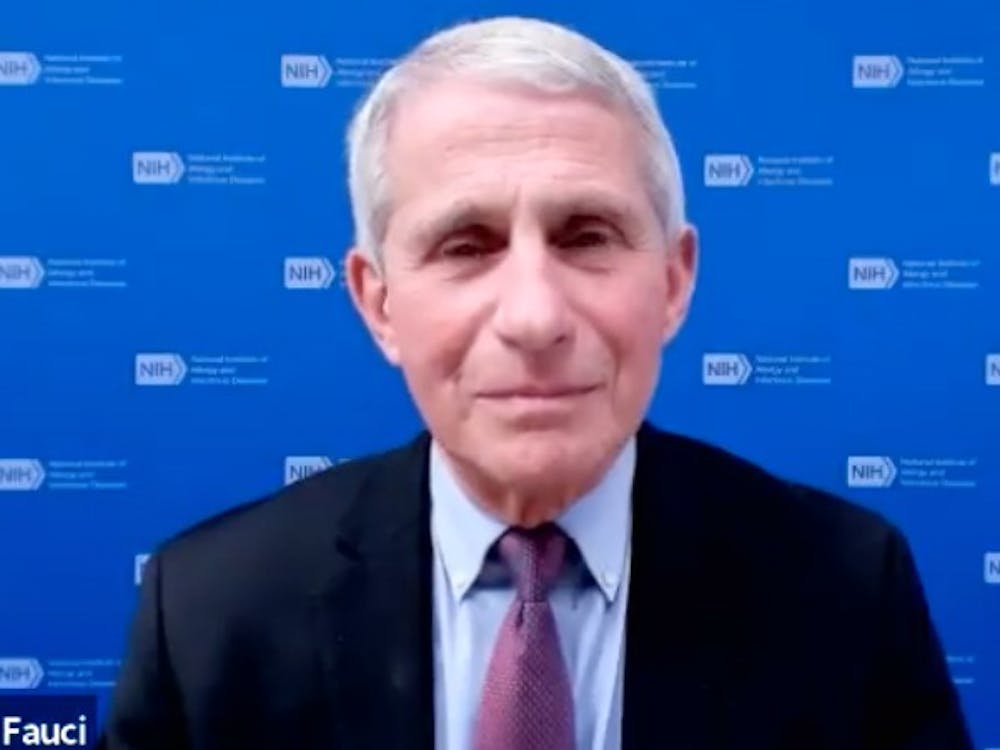Vaccines could soon begin to slow the spread of the COVID-19 pandemic, Anthony Fauci said at a Wednesday event.
Fauci and David Rubenstein, Trinity ‘70, discussed the COVID-19 pandemic and vaccine distribution at an event that was livestreamed on Youtube. Rubenstein, billionaire co-founder and co-chairman of The Carlyle Group, asked Fauci about his role as director of the National Institute of Allergy and Infectious Disease and chief medical advisor to President Joe Biden, what it was like to work for Donald Trump and his long-ago high-school basketball career.
Fauci said the pandemic situation could improve by March or April if Americans continue to wear masks, practice social distancing and avoid congregating. But he also acknowledged the presence of new threats.
“We have a challenge of variants that have now entered into the country, particularly the one that is dominant in the United Kingdom, has a capability of transmission more efficiently from person to person,” he said.
The Moderna and Pfizer vaccines appear to be effective against that particular mutation, Fauci said. However, another mutation from South Africa is more “formidable” than other variants and is being monitored.
In recent weeks, new infection and death rates have fallen significantly from the peaks in November, December and January. However, vaccine rollout has been slower than initially anticipated, Fauci said, especially considering the rapid development of the vaccine in under a year.
Fauci said he received the Moderna vaccine, though he said that there is little difference between the two and that he would have taken the Pfizer vaccine if it had been offered at the National Institutes of Health.
The second shot increases the efficacy of the vaccine tenfold, though it has shown to have slightly more side effects than the first, Fauci said. He recalled experiencing mild side effects including fatigue, aches and chills after receiving his second dose but these went away after a day.
A third vaccine would help increase the currently short supply, Fauci said. A Johnson & Johnson vaccine is currently being examined by the Food and Drug Administration, which will meet with the advisory board in a few weeks to decide if they will grant an emergency authorization.
The data shows the efficacy of the Johnson & Johnson vaccine to be around 72% at preventing all COVID-19 symptoms, compared to Pfizer and Moderna, which are closer to 95% effective. But Fauci said that these numbers are based on the percentage of those who get no symptoms at all. He said this means the vaccine is still successful at preventing and reducing the severity of infections.
“People do not require hospitalizations nor do they die,” he said of the Johnson & Johnson vaccine’s effectiveness.
The Johnson and Johnson vaccine is also more convenient in that it only requires one shot and can be refrigerated at a much higher temperature compared to Pfizer, which must be kept at minus 70 degrees Celsius.
Fauci emphasized that it is important for people to continue to wear masks even after being vaccinated because it is still possible to transmit COVID-19 while being protected from the symptoms.
“You don’t want to infect other people inadvertently, which is a reason to continue to wear a mask despite the fact that you’ve been vaccinated,” Fauci said.
When will we reach herd immunity? Fauci estimated that 70-85% of the population must be vaccinated first. These predictions are partially based on the threshold for herd immunity for measles, which is closer to 90%. Fauci predicted that most people will get the vaccine in 2021.
Rubenstein questioned Fauci about the difference working under the Donald Trump and Biden administrations. Fauci expressed skepticism about drugs that President Trump received when he was infected with COVID-19.
“Since it is only a single case, it is very difficult to tell whether he would have gotten better anyway,” he said.
Rubenstein asked Fauci about his role contradicting Trump during press conferences. Fauci said that didn’t enjoy contradicting the president, but that he felt a responsibility to maintain his integrity and transmit the right message to the American public.
“There were times when he would let me know he wasn't particularly happy,” Fauci said.
After being the face of coronavirus public health guidelines and recommendations, Fauci said he received threats against himself and his family. He said he was given a security detail.
Get The Chronicle straight to your inbox
Sign up for our weekly newsletter. Cancel at any time.
Fauci explained that soon after his inauguration, Biden told his medical team that scientific data and evidence would guide public health decisions. Unlike the approach taken by the Trump administration, where states could largely determine their own coronavirus regulations, the Biden administration will take a more centralized and federal approach.
“No matter what state you're in, infectious diseases do not know the borders of states,” Fauci said.
Rubenstein turned the conversation to sports. Fauci played basketball in high school.
“Did you ever consider playing at Duke?” Rubenstein asked.
“Not in my wildest imagination,” said Fauci. “I was a very good 5’7” point guard, but the days of the 5’7” point guard are over.”

Paige Carlisle is a Trinity senior and a staff reporter for The Chronicle.

